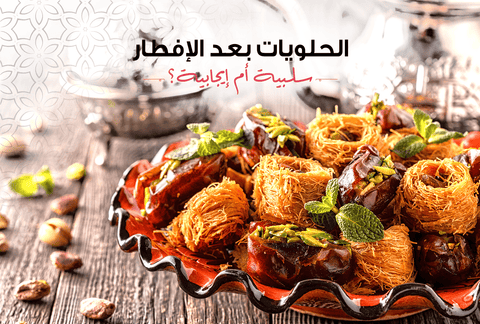Sweets, such as basbousa and kunafa, are among the most popular and delicious foods during this month, known for their irresistible taste. But despite the delicious taste of these sweets, overindulging in sweets during Ramadan can have harmful effects on our health .
So, when is the right time to eat sweets during Ramadan to avoid the harmful effects they can have on the body? Here's what we know together .
The right time to eat sweets during Ramadan
Nutrition experts recommend avoiding eating sweets immediately after breaking the fast during Ramadan, as this can delay digestion, cause intestinal distress, disrupt blood sugar levels, and lead to bloating, which increases hunger and prompts the fasting person to eat foods containing higher amounts of sugar .
It is also recommended to avoid eating sweets during the suhoor meal because they cause increased thirst and weight gain .
Therefore, medical recommendations emphasize the necessity of dividing the Iftar meal during Ramadan into two halves, the first being at the Maghrib call to prayer, and the second two hours after Iftar time. It is best to eat two pieces of dessert at most 15 minutes after the second meal .
Avoid Ramadan sweets that are full of fat, butter and sugar, and replace oriental sweets with fruits and other light sweets to avoid the increased percentage of fats and oils in oriental sweets .
Eating sweets in Ramadan in a healthy way
Eating sweets in Ramadan in a healthy way and reducing the negative effects of sweets requires adhering to several essential tips, which are :
- Limit the amount of sweets consumed to 2 to 3 times a week or a small piece every day .
- Preparing desserts at home allows you to control the portion size and prepare them in a healthy way .
- Eat dried fruits and rice pudding, which are rich in calcium, as they are considered among the best Ramadan desserts .
- Prepare fruit salad as a healthy alternative to heavy Ramadan desserts .
- Use vegetable oils instead of ghee and butter when preparing Ramadan sweets .
- Preparing syrup using artificial sweeteners gives it a sweet taste and does not contain a high percentage of calories .
- Use skim milk and a small amount of rice and sugar when preparing rice pudding and eat it in limited quantities .
- It is recommended to fry the dumplings in cholesterol-free oil, use diluted syrup, and limit yourself to one or two dumplings .
- Replace regular syrup with diluted syrup in qatayef, grease the qatayef with a little vegetable oil, grill it instead of frying it, and stuff the qatayef with walnuts or low-fat cheese .
When you eat sweets immediately after breakfast, here's what happens...
Nutrition experts say that eating sweets immediately after breakfast may expose a person to many health problems, as they contain a high percentage of sugars and white flour, including :
- Indigestion
- Intestinal upset
- Weight gain
- High blood sugar .
- Tooth decay .
Happy Ramadan
Season's greetings
Consumer Awareness Department








Comments (0)
There are no comments for this article. Be the first one to leave a message!